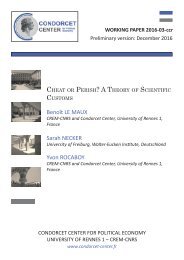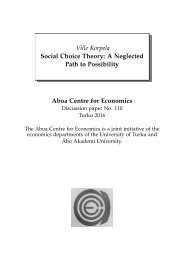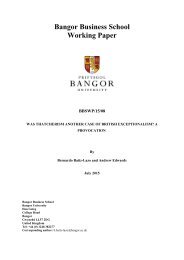MEMORANDUM
n?u=RePEc:hhs:osloec:2016_018&r=hpe
n?u=RePEc:hhs:osloec:2016_018&r=hpe
You also want an ePaper? Increase the reach of your titles
YUMPU automatically turns print PDFs into web optimized ePapers that Google loves.
extended studies in Berlin, he has particularly wanted to continue his further<br />
scientific education under your guidance, as I have heartily advised him.” 68<br />
The transition from Leningrad University to Berlin University was obviously eased by<br />
the connection between Kulisher and Sombart. It is interesting to note already here that<br />
Leontief was guided in a somewhat similar way from Berlin University to the Kiel Institute,<br />
from the Kiel Institute to NBER, and from NBER to Harvard. Obviously, the<br />
recommendations and invitations were all founded on the conception of Leontief being a<br />
highly gifted, or even quite exceptional, candidate.<br />
Berlin 1925-1927<br />
At the end of March 1925 Leontief entered a train that took him from Leningrad to<br />
Berlin with his suitcase and his recently issued passport. He retained a memory of a half<br />
empty train passing through Estonia.<br />
Hundreds of thousands Russians left their country during and after the civil war to<br />
become émigrés. Most of the émigrés settled Germany and France, at least temporarily,<br />
and particularly in Berlin and Paris. Berlin alone accommodated between two and three<br />
hundred thousand Russian émigrés, many of them clustered in the southwestern suburbs of<br />
Charlottenburg, Schöneberg und Wilmersdorf. The number of Russians swelled also in<br />
Paris and Prague. But Berlin was a particular popular choice. It was easy access from<br />
Russia. And there was a strong interest in Russia and Russian matters in Germany.<br />
Germany was not unfamiliar foreign territory. “Our family was a very intellectual<br />
family and Europe was close.” 69 As a small boy Leontief family had travelled extensively<br />
in Europe with his parents and crossed through Germany on many occasions. He had<br />
learned German very well and had had opportunity to practice it while growing up. After<br />
leaving Bolshevik Russia for Germany he was prepared to spend his life there: “I began a<br />
regular German career, scientific career and everybody accepted it”. 70<br />
Leontief did not have friends or acquaintances among the émigrés and generally<br />
eschewed them. He did not regard himself as an émigré and felt he had a different<br />
background from those who had fled Russia. He had not fled but his departure was still<br />
irreversible. He didn’t know of any student in Petrograd who like him had left for studies<br />
68 Kulisher to Sombart, 20 March 1925, transl. by ob. The letter in the Leontief archive seems to be<br />
the original, perhaps it was returned to him by Sombart. Another of Leontief’s teachers, Professor<br />
Solntsev, had studied in Berlin and knew Bortkiewicz well.<br />
69<br />
Alpers (1989, p.17).<br />
70 Alpers (1989, p.24).<br />
23





